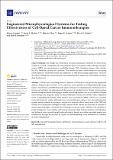| dc.contributor.author | Campisi, Marco | |
| dc.contributor.author | Shelton, Sarah E. | |
| dc.contributor.author | Chen, Minyue | |
| dc.contributor.author | Kamm, Roger D. | |
| dc.contributor.author | Barbie, David A. | |
| dc.contributor.author | Knelson, Erik H. | |
| dc.date.accessioned | 2022-07-25T18:47:10Z | |
| dc.date.available | 2022-07-25T18:47:10Z | |
| dc.date.issued | 2022-07-22 | |
| dc.identifier.uri | https://hdl.handle.net/1721.1/144036 | |
| dc.description.abstract | Cell therapies, including adoptive immune cell therapies and genetically engineered chimeric antigen receptor (CAR) T or NK cells, have shown promise in treating hematologic malignancies. Yet, immune cell infiltration and expansion has proven challenging in solid tumors due to immune cell exclusion and exhaustion and the presence of vascular barriers. Testing next-generation immune therapies remains challenging in animals, motivating sophisticated ex vivo models of human tumor biology and prognostic assays to predict treatment response in real-time while comprehensively recapitulating the human tumor immune microenvironment (TIME). This review examines current strategies for testing cell-based cancer immunotherapies using ex vivo microphysiological systems and microfluidic technologies. Insights into the multicellular interactions of the TIME will identify novel therapeutic strategies to help patients whose tumors are refractory or resistant to current immunotherapies. Altogether, these microphysiological systems (MPS) have the capability to predict therapeutic vulnerabilities and biological barriers while studying immune cell infiltration and killing in a more physiologically relevant context, thereby providing important insights into fundamental biologic mechanisms to expand our understanding of and treatments for currently incurable malignancies. | en_US |
| dc.publisher | Multidisciplinary Digital Publishing Institute | en_US |
| dc.relation.isversionof | http://dx.doi.org/10.3390/cancers14153561 | en_US |
| dc.rights | Creative Commons Attribution | en_US |
| dc.rights.uri | https://creativecommons.org/licenses/by/4.0/ | en_US |
| dc.source | Multidisciplinary Digital Publishing Institute | en_US |
| dc.title | Engineered Microphysiological Systems for Testing Effectiveness of Cell-Based Cancer Immunotherapies | en_US |
| dc.type | Article | en_US |
| dc.identifier.citation | Cancers 14 (15): 3561 (2022) | en_US |
| dc.contributor.department | Massachusetts Institute of Technology. Department of Biological Engineering | |
| dc.contributor.department | Massachusetts Institute of Technology. Department of Mechanical Engineering | |
| dc.identifier.mitlicense | PUBLISHER_CC | |
| dc.eprint.version | Final published version | en_US |
| dc.type.uri | http://purl.org/eprint/type/JournalArticle | en_US |
| eprint.status | http://purl.org/eprint/status/PeerReviewed | en_US |
| dc.date.updated | 2022-07-25T16:32:36Z | |
| dspace.date.submission | 2022-07-25T16:32:36Z | |
| mit.license | PUBLISHER_CC | |
| mit.metadata.status | Authority Work and Publication Information Needed | en_US |
